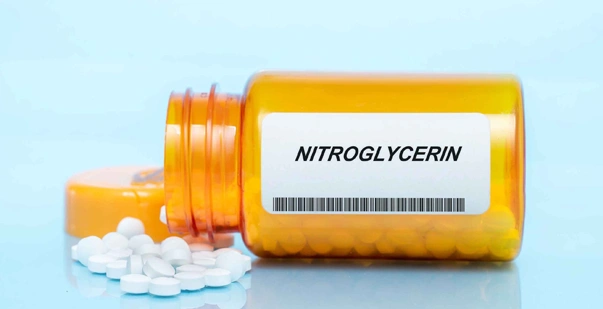In emergency ACLS interventions, prompt and decisive actions can mean the difference between life and death. Among the variety of medications used in advanced cardiovascular life support, nitroglycerin stands out for its critical role. Nitroglycerin in ACLS effectively treats and manages acute coronary syndromes, which directly improves patient outcomes. For healthcare professionals to effectively respond to cardiac emergencies, understanding function, administration, and clinical implications of nitroglycerin is essential.
Being a potent coronary arterial dilator, Nitroglycerin is commonly used in cases of ischemic discomfort. In this blog we will learn about the significance of nitroglycerin in ACLS. We will also explore the pharmacological practices and indications in different critical care settings. So let’s begin.
Master ACLS Now
Get ACLS certified with confidence
Understanding the importance of Nitroglycerin in ACLS
In ACLS, nitroglycerin plays a critical role in treating acute coronary syndromes and stabilizing patients with serious heart conditions. Few particular benefits and rapid action, makes nitroglycerin a preferred drug in the realm of ACLS. Let’s go through points stating why it is important:
- Vasodilation: Nitroglycerin relaxes blood vessels, reducing preload and afterload on the heart. This can alleviate symptoms and improve cardiac function during emergencies.
- Pain Relief: By dilating coronary arteries, nitroglycerin helps relieve chest pain associated with myocardial ischemia. This enhances patient comfort and compliance.
- Management of Acute Coronary Syndromes: It is effective in treating several conditions like unstable angina, acute myocardial infarction (heart attack), and ischemic chest pain.
- Adjunct to Reperfusion Therapy: Used alongside procedures like percutaneous coronary intervention (PCI), nitroglycerin enhances blood flow to the heart muscle, optimizing treatment outcomes.
- Quick Onset and Flexibility: Nitroglycerin can be administered rapidly via multiple routes (sublingual, intravenous). This makes it versatile for different clinical scenarios in ACLS.
Read More: Acls discount code
What are the indications of Nitroglycerin use in ACLS protocols?
In ACLS, nitroglycerin is strategically used to control several fatal cardiac conditions. Nitroglycerin has unique vasodilating properties that effectively stabilizes patients in high risk moments. Here are the indications for using nitroglycerin drip in emergencies:
- Chest Pain Relief: Nitroglycerin is indicated to relieve angina and chest pain associated with myocardial ischemia.
- Pulmonary Edema: Nitroglycerin helps reduce preload and pulmonary congestion in patients with acute decompensated heart failure or pulmonary edema.
- Hypertension Management: It may be used to lower blood pressure in hypertensive emergencies to reduce myocardial workload.
- Adjunct to Reperfusion Therapy: Nitroglycerin is administered in procedures like percutaneous coronary intervention (PCI). This optimizes coronary artery patency and blood flow.
What are the contraindications of nitroglycerin in ACLS?
Even though nitroglycerin is widely used in ACLS, healthcare professionals must be aware of few contraindications to ensure patient safety. Understanding these contradictions help making informed decisions in critical moments. Here are the key contraindications for nitroglycerin use in ACLS:
- Hypotension: Nitroglycerin can further lower blood pressure, increasing the chances of hypotension.
- Hypovolemia: In patients with reduced blood volume, nitroglycerin can worsen cardiovascular collapse.
- Increased Intracranial Pressure (ICP): Nitroglycerin can lead to cerebral vasodilation, potentially increasing ICP (Intracranial Pressure).
- Severe Anemia: Nitroglycerin may worsen tissue perfusion in patients with severe anemia.
- Hypersensitivity: Patients with a known hypersensitivity or allergy to nitroglycerin or other nitrates should not receive this medication.
- Inferior Wall Myocardial Infarction with Right Ventricular Infarction: Nitroglycerin can worsen right ventricular function and hemodynamics in this subset of patients.
Read More: How to become an active emergency medical responder with an ACLS course?
How to prepare healthcare providers for Nitroglycerin administration?
Administering Nitroglycerin requires careful preparation to ensure optimal patient safety. It is important for healthcare providers managing cardiac emergencies to understand medication administration guidelines. Here’s how healthcare providers can master nitroglycerin administration in acls:
- Training on the pharmacology, mechanism of action, and indications for nitroglycerin use.
- Understand the specific protocols and guidelines for nitroglycerin administration in ACLS.
- Learning about thorough patient assessment including vital signs, medical history, and current medications.
- Mastering proper techniques for administering nitroglycerin via different routes (sublingual, oral, transdermal, intravenous).
- Management of common side effects such as hypotension and headache.
Conclusion
Nitroglycerin continues to be an indispensable innovation in the field of Advanced Cardiovascular Life Support. The vasodilating properties of nitroglycerin helps in the management of acute coronary syndromes. But despite the efficacy, Nitroglycerin in ACLS should be used keeping the contradictions in mind. With proper training and diligent monitoring, nitroglycerin effectively enhances both the survivability and quality of life for patients.







